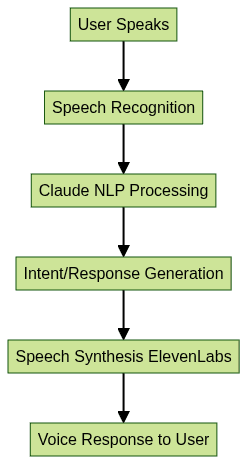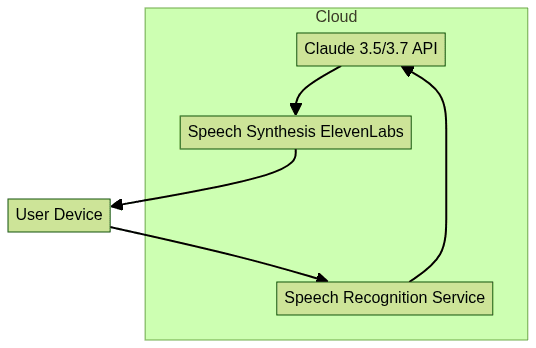Voice technology has rapidly evolved, but the introduction of the Anthropic voice agent signals a true leap forward in conversational AI. As organizations and developers race to build smarter, safer, and more natural voice experiences, Anthropic’s Claude models (now at versions 3.5 and 3.7) stand out for their blend of powerful AI, robust user controls, and a principled commitment to safety and privacy. With the rise of hands-free productivity tools and the demand for seamless multimodal AI, the Anthropic voice agent is redefining what’s possible in voice user interfaces across industries.
In this article, we’ll demystify how the Anthropic voice agent works, explore its cutting-edge features—including its collaboration with ElevenLabs for speech synthesis—and review its technical architecture, use cases, and future prospects. Whether you’re a developer, enterprise architect, or AI enthusiast, understanding the potential of the Anthropic voice agent can help future-proof your applications and workflows.
What Is an Anthropic Voice Agent?
An Anthropic voice agent is a state-of-the-art AI voice assistant built atop the Claude family of language models. Unlike traditional AI chatbots, Anthropic’s solution leverages natural language processing (NLP), advanced speech recognition, and multimodal intelligence for a more intuitive and steerable user experience. Claude’s voice mode takes the interaction further, offering customizable voice personalities such as Mellow, Airy, and Buttery—each tailored for different contexts or preferences.
At its core, the Anthropic voice agent transforms spoken language into actionable intent. Users can interact with the Claude AI in real time using voice commands, receive contextually aware responses, and even leverage visual intelligence to process images or documents. This next-gen AI voice assistant is designed for hands-free operation, making it ideal for productivity tools, accessibility solutions, and enterprise workflows. For developers looking to build similar experiences, integrating a
Voice SDK
can streamline the process of enabling real-time voice interactions.The Anthropic voice agent also prioritizes ethical AI, integrating robust security and privacy measures, and giving users granular control over how their data and conversations are handled. With multilingual capabilities and deep-learning models fine-tuned for safe, reliable responses, Anthropic’s approach sets a new standard for conversational AI in 2025.
How Does the Anthropic Voice Agent Work?
The Anthropic voice agent operates by combining speech recognition, natural language understanding, and speech synthesis in a seamless pipeline. When a user speaks, their voice is transcribed to text via speech-to-text engines. This text is then processed by the Claude model, which analyzes intent, context, and sentiment. Finally, the response is synthesized back into speech.
For developers interested in adding calling features to their applications, exploring a
phone call api
can provide additional flexibility for voice-enabled workflows.Here’s a simplified example of an API call integrating speech recognition with Claude:
1import requests
2
3# Assuming you have audio input already transcribed
4transcribed_text = "Schedule a meeting with the engineering team at 3 PM."
5
6api_url = "https://api.anthropic.com/v1/claude/message"
7payload = {
8 "model": "claude-3.7",
9 "prompt": transcribed_text,
10 "voice_mode": "Buttery"
11}
12headers = {"Authorization": "Bearer YOUR_API_KEY"}
13
14response = requests.post(api_url, json=payload, headers=headers)
15print(response.json())
16Key Features of Anthropic Voice Agent
The Anthropic voice agent brings a robust set of features for modern AI voice solutions:
Multilingual Support
Claude models offer broad language coverage, enabling real-time translation and interaction in multiple languages. If you’re building multilingual or international voice applications, leveraging a
Voice SDK
can help ensure seamless communication across different languages and regions.Visual Intelligence
Thanks to multimodal AI capabilities, Anthropic’s agent can process images, PDFs, and visual data, making it more than just a chatbot—it’s a truly comprehensive assistant.
User Control & Steerability
Anthropic’s Claude voice mode allows users to switch between voice personalities (Mellow, Airy, Buttery) and set conversation boundaries, ensuring user intent and comfort. For applications requiring advanced voice controls, integrating a
Voice SDK
can offer customizable options for user interaction.Speech Synthesis Technology (ElevenLabs Collaboration)
The agent’s natural-sounding voices are powered by a collaboration with ElevenLabs, delivering high-fidelity, expressive speech synthesis for clear, engaging responses.
Hands-Free Operation for Productivity
Designed for seamless, voice-only workflows, the Anthropic voice agent helps users manage tasks, schedule meetings, and retrieve information without touching a keyboard. Developers can enhance these workflows by utilizing a
phone call api
to enable direct voice communications within their apps.Flow Diagram: Voice Input to AI Agent

Technical Architecture and Implementation
Building with the Anthropic voice agent is straightforward, thanks to well-documented APIs and SDKs for Python, JavaScript, and other languages. The foundation is the Claude API, which can be integrated with speech recognition engines (like Amazon Transcribe or Google Speech-to-Text) and paired with ElevenLabs for speech output. If you’re developing in Python, consider using a
python video and audio calling sdk
to quickly add robust audio and video capabilities to your application. Similarly, for JavaScript developers, ajavascript video and audio calling sdk
provides a fast way to implement real-time communication features.For broader conferencing and collaboration needs, a
Video Calling API
can be integrated to support group calls and meetings alongside AI-powered voice interactions.Example Integration: Voice Input with Claude API
Below is an example of integrating voice input and response with Claude in a Node.js environment:
1const axios = require("axios");
2const { transcribeAudio, synthesizeSpeech } = require("./voice-utils");
3
4async function handleVoiceRequest(audioBuffer) {
5 const text = await transcribeAudio(audioBuffer); // Speech-to-text
6 const response = await axios.post(
7 "https://api.anthropic.com/v1/claude/message",
8 {
9 model: "claude-3.5",
10 prompt: text,
11 voice_mode: "Mellow"
12 },
13 { headers: { Authorization: "Bearer YOUR_API_KEY" } }
14 );
15 const speech = await synthesizeSpeech(response.data.reply); // Text-to-speech
16 return speech;
17}
18Security and Privacy Considerations
Anthropic’s voice agent is built with security and privacy at its core. Data is encrypted in transit and at rest, and the API supports robust user authentication. Developers can configure data retention policies and opt-in/opt-out features to meet enterprise compliance standards.
Tech Stack Diagram: Anthropic Voice Agent

Use Cases for Anthropic Voice Agent
The Anthropic voice agent is versatile, supporting a wide range of applications:
Personal Productivity
Integrate with calendars, reminders, and note-taking apps for hands-free task management and workflow automation. For those seeking to enable real-time voice collaboration, a
Voice SDK
can be a valuable addition to productivity platforms.Customer Service
Deploy AI voice assistants to handle customer queries, triage requests, and escalate complex issues, improving efficiency and satisfaction.
Enterprise Applications
Anthropic voice agents can power internal help desks, automate HR support, and streamline operations with voice-driven AI workflows.
Accessibility Improvements
Enable users with disabilities to interact with digital systems more naturally, breaking down barriers to information and services.
Comparison: Anthropic vs. OpenAI/Vagent
While OpenAI’s voice agents and Vagent offer similar features, Anthropic stands out for its ethical AI focus, deep customization, and user control. The Claude agent’s multimodal intelligence and hands-free operation put it at the forefront of enterprise AI voice solutions in 2025.
Real-World Example: Deploying a Voice Agent in a Business Setting
Consider a medium-sized e-commerce company integrating the Anthropic voice agent to streamline support:
- Assessment: Identify customer support bottlenecks and select Anthropic’s Claude 3.7 for deployment.
- Integration: Use the Claude API and ElevenLabs for seamless voice interactions. Connect with existing CRM and ticketing systems via API.
- Customization: Configure voice personality (e.g., Airy for a friendly tone) and set conversation boundaries for compliance.
- Deployment: Roll out as a hands-free help desk assistant, enabling customers to receive status updates, troubleshoot issues, and escalate cases using natural speech.
- Monitoring: Analyze usage data and feedback to refine agent performance and ensure privacy standards are upheld.
This practical approach demonstrates how Anthropic’s voice agent can transform customer service, improve operational efficiency, and uphold enterprise-grade security and privacy.
The Future of Voice AI with Anthropic
Looking ahead, the Anthropic voice agent will continue to push the boundaries of conversational AI. Roadmap priorities include expanding multilingual support, deepening visual intelligence, and advancing ethical AI safeguards. Anthropic’s partnerships with Amazon and ElevenLabs lay the groundwork for broader industry adoption, while ongoing research focuses on AI safety, user empowerment, and accessible design.
As enterprises and developers demand more from AI voice solutions, Anthropic’s blend of technical innovation and principled design promises lasting impact across sectors in 2025 and beyond.
Conclusion: Should You Use Anthropic Voice Agent?
The Anthropic voice agent is a next-generation AI voice assistant that marries advanced technology with ethical safeguards. Its robust feature set, focus on user control, and enterprise-ready architecture make it a top choice for developers and organizations seeking safe, powerful, and customizable voice solutions. For those committed to responsible AI, Anthropic’s Claude is the voice agent to watch in 2025.
Ready to experience the future of conversational AI?
Try it for free
and explore how Anthropic’s voice agent can transform your workflows.Want to level-up your learning? Subscribe now
Subscribe to our newsletter for more tech based insights
FAQ